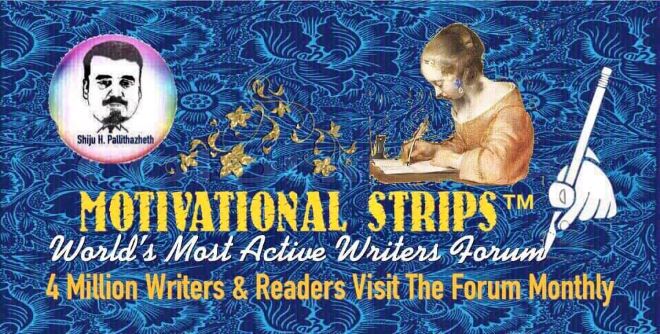The Grapevine Art & Soul Salon
Shiju H. Pallithazheth and Motivational Strips: Introduction by Barbara Knott

My deep appreciation to the Motivational Strips group and leader for making possible my acquaintance with the four poets featured in our Praise Poems column and with so many others. I cannot imagine having found them without my participation on the site (and their participation as well). I expect to invite many more guests from there to The Grapevine.
I might add that Shiju Pallithazheth has modeled for us a far-reaching book promotion pattern for his recent release of Katashi Tales: Folk Tales & Fables Unheard. Billed as "A Collectible Treasure for All Ages," the book has become a bestseller by his cultivating exponential exposure and appeal through many channels, some of them created by posting reader responses on his site that numbers so many members, most of whom have audiences of their own. The book cover mentions his additional activities as a motivational speaker, mentor and writers' coach, as well as his numerous honours and awards from worldwide literary circles and academies.

Given his position as founder of Motivational Strips, it is not surprising that he dedicates the book "to world literature and global writers." I was pleased to read of his reflections on "the influence of mysterious waves from some unseen cosmic force" that "makes an author's mind travel through fantasies." This remark corresponds in interesting ways to The Grapevine's many ruminations about soul in the universe and in the interior life of all beings.
The tales are narrated from under an old oak tree in the village of Katashi by a wise woman named Katuri after she has summoned her audience by walking through the village holding a wooden stick and "calling out to all the children and elders to join her under the oak tree." Here we have an archetypal setup of ancient tree, storyteller and stories, including animal fables, that bring amusement and inspiration to the mind and heart. Many of the tales illustrate the pitfalls of human foibles. Reading, I became increasingly reminded how fables throughout time have shown human qualities projected onto animals who then play them out in stories. That kind of distancing must have allowed children in particular to "see" better how ridiculous it is to be at the mercy of arrogance and pride and vanity. No doubt these were good teaching moments for the storytellers. Even though narrated in one small village, the tales refer to a variety of places around the world, from Switzerland to Africa to South America. As in Motivational Strips, so in this book there is an international sweep of interest.
Shiju Pallithazheth is releasing a second book this month. Here is a link to a review on the Motivational Strips site:
Shiju H. Pallithazheth, The Ghost Wisdom, Reviewed by Brenda Mohammed
Cheers! to the author of the two books mentioned here and founder of Motivational Strips, to the creative staff, and to the enormous group of talented members, as well as to Facebook for making this work and play possible.
July 20, 2017 Addition
Barbara Knott: Introduction to The Ghost Wisdom by Shiju H. Pallithazheth
(Dedicated to world literature and global writers)
It is my smiling pleasure to introduce readers to a book new on the literary scene at Facebook’s Motivational Strips group of global writers and available at Amazon.com. Shiju H. Pallithazheth, founder and chief administrator of Motivational Strips as well as Honorary President for World Nations Writers’ Union and Union Hispanomundial De Escritores, follows his recent release of Katashi Tales, now a bestseller on the global market, with a different kind of book, this one a book of wisdom insights presented as a guidebook or self help book for the general public as well as for those with literary ambitions. For comparison, I think of titles like How to Win Friends and Influence People and The Power of Positive Thinking that came out in the U. S. such a long time ago. But unlike them, The Ghost Wisdom has the charm of a literary author who understands that the power of prose increases when you make use of any or all literary resources at hand. Example: the author presents his advice, his mentoring, through an enchanting setup.
The Ghost in The Ghost Wisdom comes through as a supernatural force, a voice that constellates in a smoky puff of barely visible air at strategic moments when the author is in first one geographical location and then another and then others … eleven in all. In each location, the voice whispers ten pieces of “wisdom” into the author’s ready ear to be recorded on his telephone for later transcription. So, in each of these eleven segments, we have a pleasing description of location, a brief interaction with the Ghost, and a laying out of wisdom sayings with commentaries.
It’s important to notice that the Ghost whispers, a way of delivering words that causes the reader/listener to lean in, with a more intense focus of attention on what is being said. That’s what we do when someone (friend, lover) invites more intimacy in speaking and listening.
As a poet trained also in theater arts, I was delighted to discover the way in which the author sets up his discourse with this ghostly figure who appears to him as he adventures into different parts of the world. The dramatic presentation of insights is captivating in a way that academic prose by itself is not, and so this book of inspirational teaching has a better chance of engaging a reader’s interest than abstract writing alone might do. So the author creates enchantment, then delivers very practical guidelines related to what it means to be (a successful) human, with recommendations regarding the importance of curiosity, desire, observation, experience, humility, handling stress, respectful interactions with others, thoughtfulness, the value of uncertainty, asking questions, listening, timing, understanding personal potential, optimism, good faith, common sense, teamwork, leadership and so on … all abstractions until they are connected to people and circumstances like depression and love, and to actions, problem-solving, celebration, gratitude.
Samples of advice (paraphrased):
Keep your desire to be wiser alive (p. 6).
Cultivate the perspective of a curious child (p. 12).
Never succumb to being a know-it-all (p.15).
Love yourself without hatred of others (p. 16).
Filter out pessimism (p. 23).
And here, for example, is “the seventh whisper” from the first segment, directly quoted: “Human potential has no limit unless you decide to rest.” (p. 17)
Speaking now as an academically trained psychologist, it is clear (as the author says) that books are helpful in our shaping of character, but what matters most is how we are moved by what we find in books. Wisdom needs to enter the organic realm to take effect in our lives. And it is clear to the reader, I think, that this Ghost is Shiju H. Pallithazheth’s personal revelatory messenger, and that we can extend what we learn from his book by locating such a voice within ourselves (as in insight and intuition) that may help us carry on a lifetime of growth and development along the lines of our greatest potential. The Ghost Wisdom may prove helpful in starting such a journey, in supporting those already moving along the way, and in teaching us how to share such a journey in conversations.
This introduction is a tiny taste mainly from the first of eleven deposits of such sayings as well as commentaries on them. You can order up the full feast at Amazon.com!

Copyright 2019, Barbara Knott. All Rights Reserved.